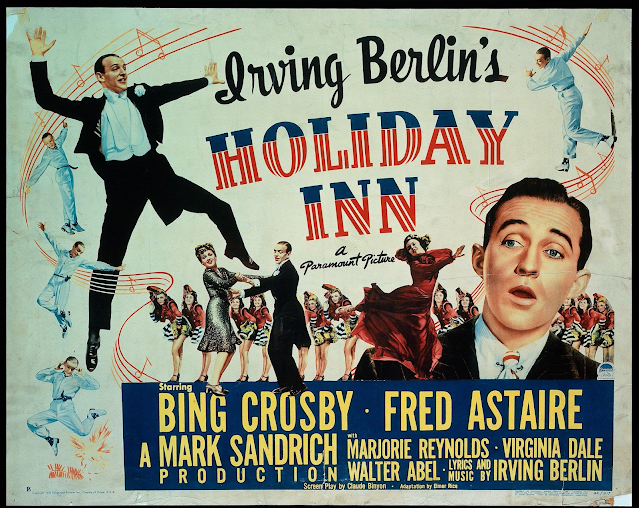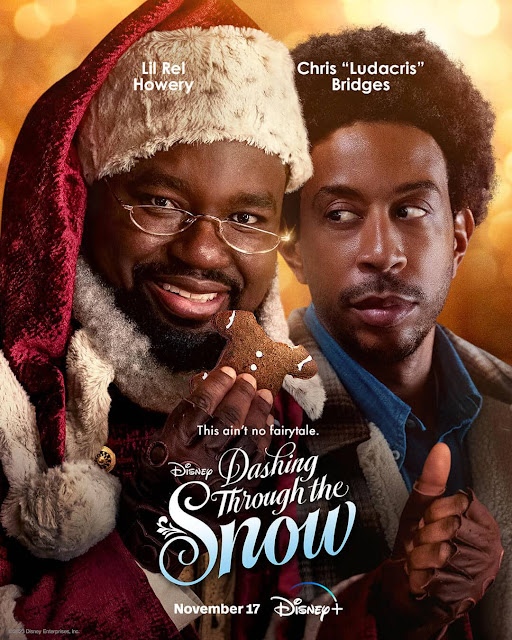Watched: 12/04/2023
Format: Prime
Viewing: Unknown
Director: Mark Sadnrich
My understanding is that this movie, released in August of 1942, landed hard with Americans as we were facing the reality of what was going to be a long and deadly war on two fronts. More specifically, this movie features the screen debut of "White Christmas" (he's sung it on the radio post-Pearl Harbor in 1941), which Bing Crosby would turn into the best selling single of all time with 50 million copies ringing up the tils as it became a sort of anthem for wishing for a return to normalcy.
Holiday Inn (1942) is a story about a musical trio breaking up as the singer (Crosby) and the girl are breaking off to start a new life running a farm in Connecticut when the girl runs off with the dancer (Fred Astaire) to pursue dreams of stage glory. Crosby eventually turns the farm into an inn where he can put on shows, just on holidays, trading the dream of stardom in exchange for just having a bit of fun every once in a while.
Along comes a new girl, and a series of shows for every holiday starting with New Year (after introducing "White Christmas" during the meet-cute). Meanwhile, Astaire is dumped and returns to the Inn, and begins pursuing the new girl whom Crosby has fallen hard for.
Anyway, the story is just a framework for Bing Crosby to dooby-doo his way through songs and Astaire to knock your socks off. Unfortunately, I don't think it leaves you feeling particularly great about a single person on screen except for Crosby's chef, played by Louise Beavers.
There is mention of the war during the WWII sequence as the movie pauses to reflect on what we're fighting for in song, and shows film of our militarization and FDR at the mic. While the film exists as light entertainment, its hard to imagine what July 4, 1942 was actually like as the country leaned into what was clearly going to be a multi-year effort in which we'd lose countless servicemen and women. But what is apparently true is that Pearl Harbor occurred during filming and they decided to really step up the July 4th sequence.
It is likely you've heard several songs from this movie over the years. "Easter Parade" gets trotted out. And it's worth mentioning Crosby would team with Danny Kaye for the 1954 classic White Christmas while Astaire would beat him to the punch with 1948's Easter Parade.
I was surprised to see the version on Amazon Prime retains the blackface number (Lincoln's Birthday). Though I remember seeing it on my TV Christmas of 1994 when I first watched the movie, basic cable cut the number decades ago. And, yes, it is that bad. It's also a plot point, so the movie can be marginally confusing without the number, but to keep it in... Look, I am not going to tell you what should or should not offend you or what criteria should be used to play or not play a film. I am fine with cable cutting the sequence to keep the film out there, and from an historical perspective, the movie is a reflection of the time in which it was made. As film fan and historian, yes, keep it in. As a person who knows this is f'd up, and always was - you can skip the movie altogether if you like. There are clips of not-offensive scenes on YouTube. Or, jump over the scene whilst watching. You do what works for you.
We chose to ffwd through the sequence once we realized it was there. I've seen it, don't need to see it again.
There's a whole discussion to be had about how it seems the younger generation wants to deal with older media, and that's to stuff it down the memory hole. And I'll argue some film historians are currently trying to make it seem that very-mainstream-Hollywood was out of step with the general attitudes of the public at the time of a film's release, something I think there's more than ample evidence to suggest is not true. We can discuss at some point, but that's a lot to hash out.*
What it does mean is that Holiday Inn is a fascinating bit of history in a single Christmas movie. The film spun off multiple hit singles we still know, it sold people on the idea of secular Christmas songs, it does some crazy stuff where part of the illusion in the film's final minutes is *showing* the pulleys and levers of the illusion right out in the open to create a secondary illusion (and showing how films were made in 1942). It shows some really depressing racism, sexism, etc... and it's a time capsule containing war propaganda.
Plus, two of the biggest stars of the era. Happy Holidays, film lovers.
*this is 78 years after *slavery*, and 6 after Gone With the Wind. It's not just your elderly relatives that were just wildly racist.










